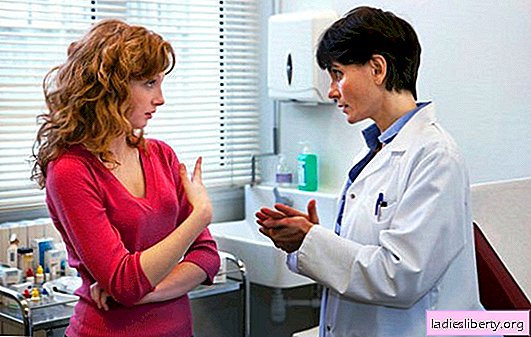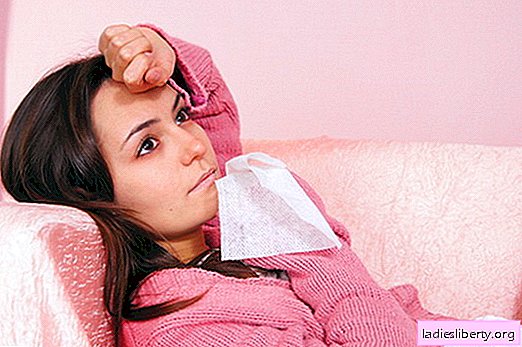
Urethritis is an inflammatory disease of the urethra (urethra). The pathology itself does not pose a threat to life, and if treatment is started on time, everything will end safely. But urethritis causes so much discomfort that it violates all plans, and, most importantly, with inadequate treatment leads to serious complications.
Urethritis in women is common, contrary to popular belief that they are exclusively affected by men. Due to the anatomical differences in the structure of the urethra, it proceeds harder in men. The woman's urethra is short (up to two centimeters) and wide, which makes it possible for the infection to easily penetrate into it and cause inflammation, but at the first urination, part of the microorganisms is washed out by urine. The male urethra is long, with bends and narrow - these are ideal conditions for the development and further spread of infection.
In men, urethritis is detected more often and earlier due to the fact that the symptoms in women are in most cases blurred or absent, although the prevalence of urethritis is the same in both sexes. Due to the asymptomatic nature of the disease, a woman may not turn in time for help, but this will happen even when a vivid picture of the complication arises. In addition, urethritis often occurs simultaneously with cystitis, which complicates urethritis.
Urethritis in women - causes
Urethritis in women is caused by infectious microorganisms or other causes unrelated to the infection. Accordingly, urethritis is classified as non-infectious and infectious. The latter, in turn, is divided into specific and non-specific.
The causes of non-infectious urethritis include:
- urolithiasis, in which the mucous membrane of the urethra is damaged by small stones or fragments with sharp edges;
- malignant neoplasms in the urethra, causing an inflammatory process;
- various injuries of the urethra that occur during medical procedures (cystoscopy, catheterization);
- allergies;
- gynecological diseases;
- a sedentary lifestyle that leads to venous congestion in the vessels of the pelvic organs;
- first sexual contact.
The cause of infectious urethritis in women is conditionally - pathogenic and pathogenic microflora. Conditionally - pathogenic microorganisms causes non-specific urethritis in women. Conditionally - pathogenic microbes (staphylococci, streptococci, gardnerella, protea, Escherichia coli, enterobacteria, fungi, adenoviruses) are mostly present in a healthy body. For the development of urethritis, the impact of certain factors that provoke its development is necessary. Such a push could be:
- an allergic condition;
- reduced immunity;
- subcooling;
- constant stress, psycho-emotional overload;
- improper nutrition (spicy, fatty, salty foods in large quantities), diets, vitamin deficiencies;
- alcoholism;
- period of pregnancy.
As a result, an imbalance of conditionally pathogenic microflora occurs, which leads to the development of infectious non-specific urethritis.
Pathogenic microflora is the cause of specific urethritis in a woman who is sexually transmitted. It includes gonococci, chlamydia, Trichomonas, etc.
The diagnosis of nonspecific urethritis is made in cases when the pathogenic flora, which is the causative agent of specific urethritis, is not found in the smears.
Urethritis in women - symptoms
With urethritis in women, in most cases, there are no vivid symptoms: everything is lethargic, erased, almost asymptomatic.
The incubation period for infectious urethritis, depending on the pathogen, can last from several minutes to several months. But even after the incubation period, urethritis in women can be asymptomatic. And despite the absence of symptoms, urethritis is transmitted sexually and is dangerous due to complications, as it seems among full health.
Clinical symptoms characteristic of all types of acute urethritis:
- discomfort and itching when urinating;
- unpleasant pain in the lower abdomen;
- discharge from the urethra;
- sometimes signs of blood in the urine.
All symptoms do not appear at the same time.
Intoxication does not develop: there are no rises in temperature, headaches, weakness - the general condition is not violated.
Chronic urethritis in women is asymptomatic, clinical signs of the disease appear during an exacerbation and with complications already developed: colliculitis, cystitis, urethral strictures. Sometimes with chronic urethritis in women there is pain in the lower abdomen and a burning sensation after intercourse. In the chronic form, urethritis passes with inadequate or late treatment. This occurs three weeks after the development of urethritis in a woman, when the main symptoms of the disease disappear. In the future, the symptoms of urethritis can clearly manifest when exposed to provoking factors:
- subcooling,
- unprotected sex
- stress
- excessive drinking.
- The first days of menopause, during menstruation, with the abolition of oral contraceptives.
It is also necessary to know that specific microflora can join sexually non-specific urethritis and then secondary specific urethritis may develop.
Urethritis in women - diagnosis
For the diagnosis of urethritis in women, in addition to routine methods, bacteriosis of a smear or scraping from the urethra is used. If a specific flora is not determined, a diagnosis of nonspecific urethritis is made. Sometimes instrumental research methods are used:
- urethroscopy - endoscopic examination of the urethral mucosa - if necessary, allows you to take material for biopsy and eliminate developed strictures (narrowing);
- urethrocystoscopy - in addition to the urethra, it allows you to examine the mucous membrane of the bladder, which is also often involved in the inflammatory process;
- Ultrasound of the pelvic organs allows you to determine the pathology of the genitourinary system.
Urethritis in women - treatment
Treatment of uncomplicated urethritis does not require hospitalization; it is carried out on an outpatient basis with follow-up examinations by a doctor.
Treatment of infectious urethritis in women (both specific and non-specific) begins with the appointment of antibiotics. The exception is fungal and viral urethritis.
1. Broad-spectrum antibiotics are prescribed immediately, as soon as the diagnosis is made, without waiting for the results of the bacteriosis. In case of non-gonococcal urethritis (if a sexually transmitted infection is not detected in the smear), women use antibacterial drugs of different groups in the treatment, of which azithromycin, clarithromycin, ofloxacin, ciprofloxacin, amoxiclav, etc. are most often prescribed.
2. Sulfanilamide preparations (doxycycline).
2. Antimicrobial (metronidazole).
3. Immunocorrective and vitamin complexes.
4. Local treatment: herbs in the form of decoctions with anti-inflammatory properties (calendula, chamomile, knotweed) and antiseptic solutions (potassium permanganate) in the form of baths.
5. Physiotherapeutic treatment - electrophoresis, warming applications.
6. Installations in the urethra of uroseptics - chlorhexidine, protargol, collargol.
7. Compliance with the diet: excluded pickled, spicy, salty, smoked food, a large amount of liquid is shown and the transition to lactic acid products.
8. An exception for the period of treatment of alcohol, smoking, restriction of physical activity, sexual intercourse, hypothermia.
If pathogenic flora is detected in the results of bacterial seeding, both sexual partners should undergo treatment to exclude reinfection and complications. With non-specific urethritis in women, treatment of a sexual partner is not required.
The criterion for the success of treatment of urethritis in women is the achievement of a satisfactory condition and the normalization of the results of bacteriosis.
Urethritis in women - prevention
Preventive measures for urethritis in women:
- it is necessary to use condoms, which will protect against infections in case of accidental sexual intercourse;
- before and after sexual intercourse, you can take a tablet of furamag for the prevention of infection;
- after intercourse, it is necessary to urinate - part of the pathogenic microorganisms will be washed off with urine;
- compulsory hygiene;
- regular but erratic sex life;
- a mandatory visit to the gynecologist 1 r / year, even if there are no complaints;
- maintaining immunity;
- avoid stress, hypothermia, excessive physical exertion;
- periodically take courses of vitamins.
Given that every second woman in her life is faced with urethritis, it is necessary not only to remember these rules, but also to abide by them.











